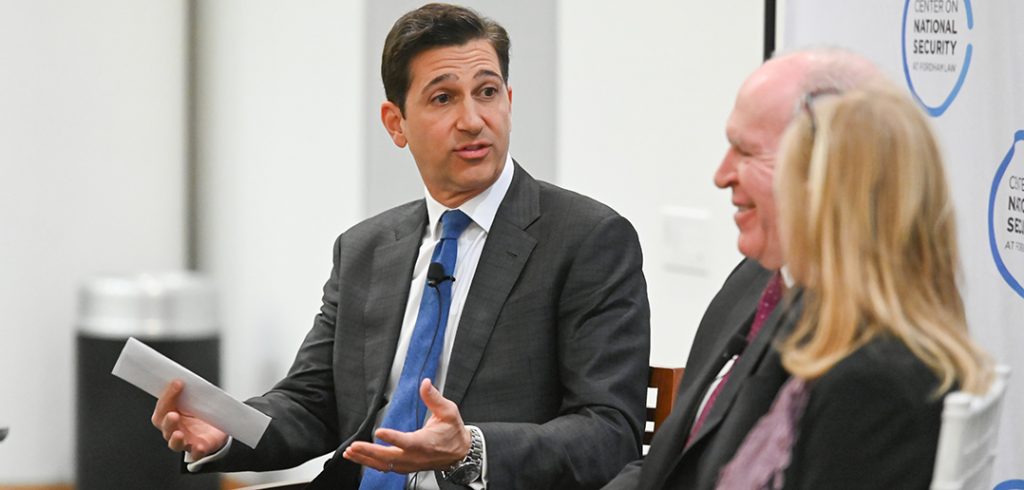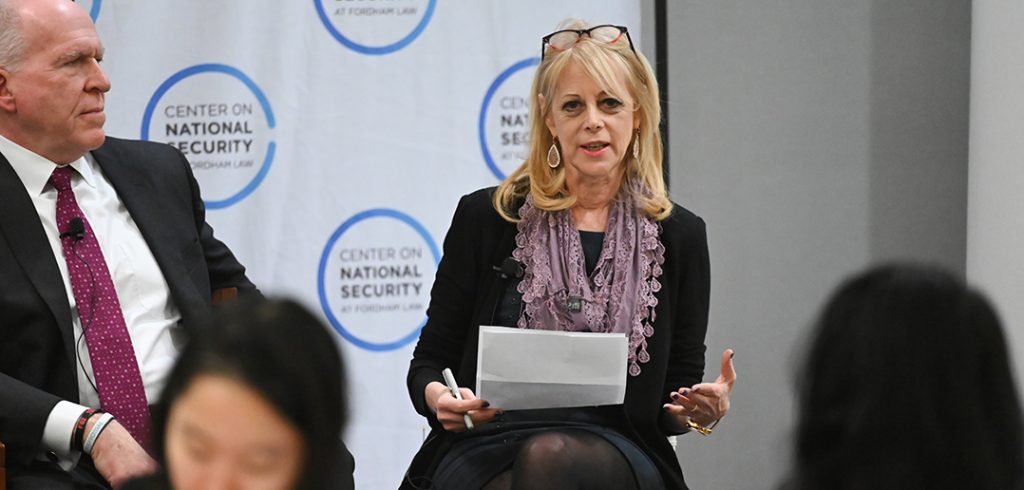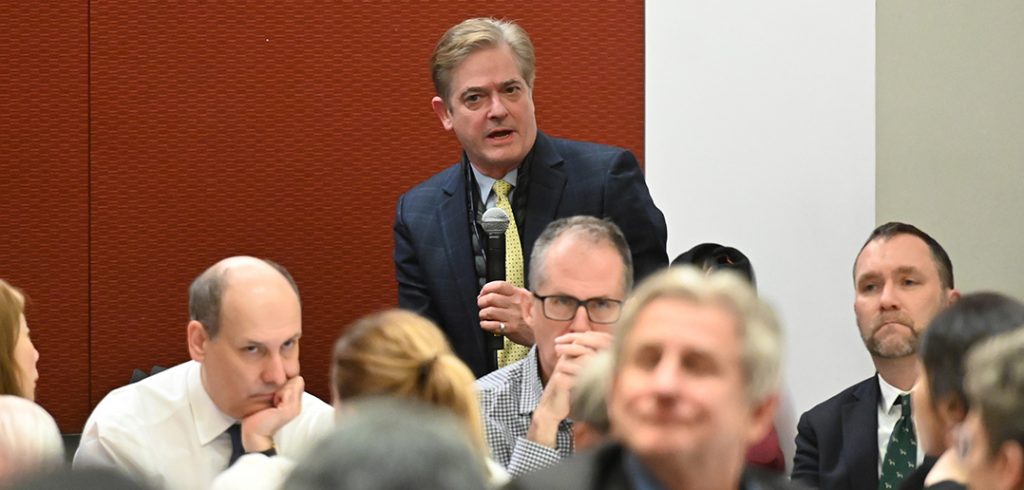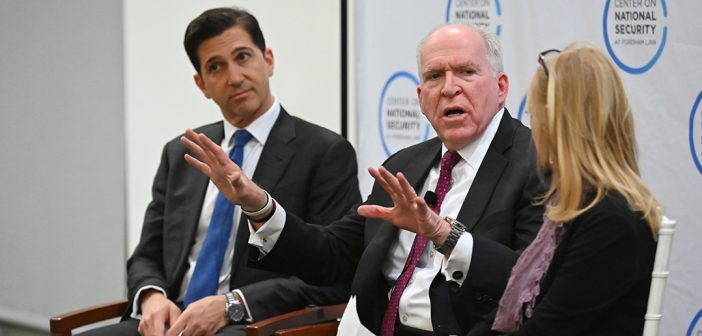Brennan, a distinguished fellow on global security at the center, acknowledged that Soleimani was a “principal nemesis” of his while he was director of the CIA and that the general represented a threat to U.S. security, but he did not see a legal basis for the strike.
‘We’re Not at War with Iran’
Brennan made a clear distinction between an “unlawful combatant,” such as the leader of a terrorist group, and an individual acting on behalf of a sovereign state, such as a military general. He said that according to the Geneva Convention and “a lot of other important foundations,” a non-state actor is not afforded the same protections as a state actor working on behalf of a sovereign state.
“We’re not at war with Iran,” said Brennan. “We have struck Al-Qaeda terrorists numerous times, but they are unlawful combatants. I see no equivalency, either in … a domestic or international law, that striking a government official of a foreign country that you’re not in war with has a legal basis.”
Indeed, Brennan cited congressional hearings held in the 1970s that found that the CIA was involved in several “extra-legal” killings. The hearings resulted in an executive order passed by President Gerald Ford in 1976 that banned the assassination of state actors. He added that by the current administration’s rationale, the U.S. could take out the head of the Russian Federal Security Service because that agency is involved in nefarious activities.
“[The killing of Soleimani] certainly is very dissimilar from the strikes against unlawful combatants belonging to Al-Qaeda or any of the other terrorist groups that are in fact named in the authorization for the use of military force that has been in existence since 2001,” he said.

Ken Dilanian of NBC News
Drone Technology: Advances and Ethical Questions
That Soleimani was killed by a CIA drone, a technology used in a program supported by Brennan, was not lost on the audience, the interviewers, or Brennan himself. Dilanian asked him about the significant advances in the technology that enabled the killing. Brennan said two factors have played a large role in making such stealth and exact attacks possible. One is that today everyone leaves behind “digital dust” from their cell phones, credit cards, and from closed-circuit cameras watching them.
“It is not difficult at all to learn, through legal means, and then through government means, where somebody is,” he said.
Second, he said, is the “increasing refinement and advancements in technology about putting the ordinance on target … within inches.” And if that person moves, as was the case with Soleimani’s caravan at the Baghdad airport where he was killed, a missile can be steered in that direction at the last minute. He added that with machine learning, there is an additional ability to correlate all that information at the speed of light.
“It raises very serious questions about at what point should those actions that result from the machine learning and the ingestion of data require human intervention?” he said.
He said that in the case of the Obama administration, for every decision that was made to strike a terrorist, there was a rigorous review that had to determine that there was no other way to mitigate the threat that that person posed, except by the use of lethal force.
“Before striking that individual, there had to be near-certainty that that was the person, near certainty that there’d be no civilian casualties, there was no possibility of capture, by either U.S. forces or by local forces … in order for it to be an authorized strike,” he said, adding that no such criteria have been clearly articulated by the Trump administration in the Soleimani killing.
Concern About Retaliation
Brennan admitted that the strike was a significant blow to the Iranian high command, but he warned that “the concept of an eye for an eye” is very strong in Iran. Despite a retaliatory strike by the Iranians on a U.S. airbase in Iraq that resulted in more than 60 traumatic brain injuries of U.S. soldiers, there may still be yet another attack to come.
“We know that the Iranians have long memories, we know that they can be patient, and so I believe that there are some in Iran who will want to avenge Soleimani’s death with blood, not with brain injuries,” he said.
Greenberg noted that in attacking Suleimani, the Trump administration used the authorization for use of military force (AMF) from Congress set in 2001 and 2002 for those responsible for the 9/11 attacks and for attacking Iraq, respectively.
“Given that the scenario you’ve just laid out for the decisions that might be in front of the White House coming down the pipe, like this incident, do we need a new AMF, and if so, how would we begin to think about its focus, its limits?” she asked.

Karen Greenberg, director of the Center on National Security at Fordham Law
Congressional Authorization in the Trump Era
Brennan said that his views have changed on Congressional authorization since the Obama administration, when he thought that their approval constrained the president’s ability to act swiftly, such as in the case of Obama’s effort to close Guantanamo Bay prison.
“I felt that Congress’ intervention was really counterproductive to the ability of the chief executive and the commander in chief to carry out responsible policies,” he said. “Now during the Trump years, I feel as though, ‘My goodness, where’s Congress?’”
Yet, he said, the nation needs to be cautious in “reshaping the architecture of the federal government” in response to an unpredictable Trump presidency.
“He clearly is an anomaly, and he clearly is doing some things that I think would not have been expected of anybody that we thought would make their way to the Oval Office,” he said. “He’s trampling a lot of the foundations of our democratic republic, and I think he’s also demonstrating a real lawlessness. And so that’s the struggle now. What do you do when you have a lawless president? I would put the Soleimani killing in that bucket.”
He said the challenge would be to ensure that the mechanisms of government remain flexible enough to survive into the future, though he remains troubled that the Republicans in Congress have “checked their principles at the door.”

History Professor David Myers asks a question about whistleblowers.
Doing What’s Right
When the conversation turned to impeachment, Brennan said, “I would love to be able to just sit in on a Fordham Law School class on the issue of ethics and defense attorneys,” noting that these topics are front and center in the hearings.
“There’s a cravenness right now in Washington among politicians that just refuse to do what is right. And then you can have very respected attorneys who are well known, some lawyers with big egos, to go up and do anything possible to get somebody off.”
During the question and answer period, David Myers, Ph.D., professor of history, asked if Brennan thought that the unwavering support from Republicans in Congress might stop future “good-minded, good-hearted intelligence servants” from coming forward as whistleblowers in the future.
Brennan said that he certainly hopes that will not be the case.
“I sure as hell hope they speak up. And it can be costly and people are going to come after you. It’s been costly for me. People come after me, but sometimes, maybe it’s my Fordham training or my Irish temper or any number of those things, but I feel that I have no choice but to speak out because what’s happening now is wrong. And if you are a person in the intelligence community and you see things wrong, speak up and speak out because it’s the right thing to do.”



